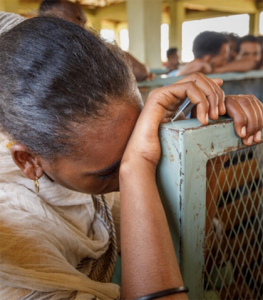Fresh humanitarian crisis hits Ethiopia
A fresh refugee crisis has erupted in strife-riven Ethiopia after thousands of Eritreans were forced to flee a camp when fighting flared between Ethiopian government troops and separatists in the Afar region.
The UN refugee agency UNHCR says that unidentified assailants targeted Barahle camp earlier this month after fighting engulfed the area.
 “Refugees who trekked the long distance to the regional capital in Semera reported that armed men entered the camp on 3 February, stole their belongings and occupied their homes,” a UNHCR statement said.
“Refugees who trekked the long distance to the regional capital in Semera reported that armed men entered the camp on 3 February, stole their belongings and occupied their homes,” a UNHCR statement said.
“According to their testimonies, at least five refugees were killed. Family members lost one another in the chaos of fleeing the camp.”
The attack is the latest example of Eritrean nationals living as refugees in Ethiopia coming under fire, since conflict erupted and spread from the northern Ethiopian region of Tigray in November 2020.
An investigation by the UN human rights office OHCHR and the Ethiopian Human Rights Commission in November reported on how Tigrayan separatist and national Ethiopian fighters the lives of thousands at risk in Shimelba camp, between November 2020 and January 2021.
Following the attack in Afar, more than 4,000 refugees reached Semera, where UNHCR and the Ethiopian Refugees and Returnees Service are providing shelter, relief items, food as well as clean water.
Another 10,000 refugees are also said to be living in Afdera, a town 225 kilometres from Semera. Yet more are believed to have fled towards the towns of Altefa and Dabure, further inland.”
Last month, the UNHCR urged the international community to do more to end the fighting in northern Ethiopia after finally reaching Eritrean refugees in Tigray region who were suffering food shortages.
“With yet another refugee camp severely impacted, UNHCR remains extremely worried about the safety and wellbeing of thousands of Eritrean refugees caught up in the conflict,” A UNHCR spokesperson said.
“Hostilities must cease and humanitarian access must be provided so that we can be there and help the people who have urgent needs.”
The conflict in Tigray flared in November 2020 when Prime Minister Abiy Ahmed ordered a military intervention against the region’s powerful ruling party, the Tigray People’s Liberation Front (TPLF), after reports of attacks on government military bases.
Aid operations in Tigray, which hosts around 200,000 internally displaced people and refugees from neighbouring Eritrea, have been severely curtailed since.
Tensions between the TPLF and the federal government have been escalating since September 2020, when Addis Ababa indefinitely postponed regional and national elections because of the COVID-19 pandemic. TPLF officials opposed the decision and organised their own elections.
An ethnic Tigrayan party, the TPLF was the dominant force in Ethiopian politics until Abiy took office in 2018. Its members have since lost positions within the central government, and several officials have been arrested for corruption and human rights abuses.
Just six percent of Ethiopia’s more than 100 million population live in Tigray, but local officials have dominated the country politically since the TPLF led a guerrilla struggle that defeated the country’s Marxist junta, known as the Derg, in 1991.
In power, the TPLF introduced a new constitution that saw Ethiopia divided into nine ethnically based regions – each with their own security forces, parliaments, and the right to secede.
The party was the driving force within the Ethiopian People’s Revolutionary Democratic Front (EPRDF), a coalition of ethnic parties that was controlled by the TPLF and ruled with an iron fist for almost 30 years.
The removal of Tigrayan officials after Abiy – an ethnic Oromo – came to power on the back of mass protests against the EPRDF, fuelled by a sense of ethnic discrimination among party members.
Then, last November, Abiy dissolved the EPRDF, creating a “pan-Ethiopian” national party, known as the Prosperity Party, which opposition groups considered an attempt to centralise state power and deconstruct the federal system. The TPLF refused to join.
Since the TPLF won regional elections in September, both sides have described each other as illegitimate, while the finance ministry in Addis Ababa has frozen money to Mekelle, Tigray’s capital – a move TPLF leaders have said was a “declaration of war”.
Tigrayan leaders have complained of being unfairly targeted in corruption prosecutions, removed from top positions and blamed for the country’s problems.
Both sides of the conflict are heavily armed. The national army has redeployed troops to Tigray from across Ethiopia amid concerns about the loyalty of the Northern Command, which constitutes a large proportion of the country’s overall number of troops.












